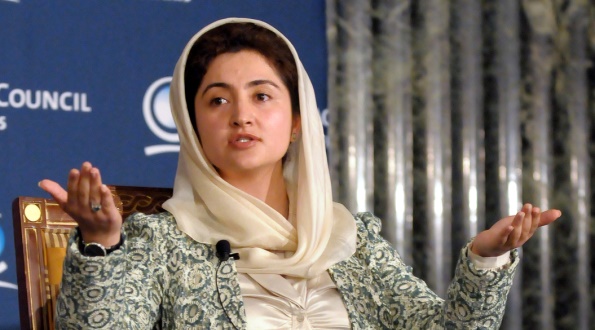BECOME A MEMBER
>JOIN
Afghan Men Now See Women as a Challenge, says PN Member Farkhunda Naderi

She doesn't wear a burkha, but successfully contested the 2010 Afghan Parliamentary elections on the symbol of the blue burkha identified with Afghanistan.
Farkhunda Naderi, 32, explained the rationale behind her choice: "Whenever men saw photographs of female candidates, they would talk only about their eyes and eyebrows instead of discussing their manifestos or chances. I thought, excuse me, we are fighting an election, respect us. So I decided I won't put a picture of myself, but my symbol would be the burkha."
She said that women did get alarmed, wondering whether she was promoting the burkha.
"I explained its meaning... It was imposed on us to make us weak. But under it, we have become tough. The small window behind which we are confined, we can convert that into a window of power," said the Parliamentarian.
Naderi broke a few myths about the 'oppressed Afghan woman' in her talk in the city this week, organised by the Asia Society. Despite being in war, women were venturing out of the house. In fact, the focus on women's rights had changed the Afghan women to the extent that men, used to decades of superiority, were seeing them as a challenge.
Earlier, they wouldn't take women seriously. Now, they feared women's empowerment so much that they got together in July to decrease the 25 per cent quota for women in Parliament, guaranteed by the 2004 Constitution, she said.
"We forgot that the struggle for empowerment has to be done with men. Otherwise there won't be any common language in families between men and women. Creating borders between the sexes results in more violence in the family and in the community. We have to get more men in our fight. In Parliament too, we have to get them to raise women's issues," Naderi said.
There was a need to have school students learn about women's rights, so that boys wouldn't grow up to feel superior, to keep a watch on their sisters and then to kill them for 'honour', she said.
Naderi said that real power for women would come when a woman is appointed to the Supreme Court.
"If a woman got in - and there are qualified and experienced women - she could interpret every law from her perspective. Currently, male jurists can deem any law on women's rights unIslamic," she said.
But right now, per se, the presence of girls in school and of women in politics was very important to encourage others.
Afghan parents wanted to educate their daughters, but they needed to know it's safe to do so. That was one reason why the elections scheduled for May 2014 were so important, she said.
"There is no substitute for an election. Only an election will give hope and power to our people. There is fear, but if we make security an excuse, it only helps those who have wielded power so far," she said.
Fear and a lack of interest may prevent people from voting, Naderi said.
"Our democracy is very fresh and fragile and people are critical of it. But I tell them, you have the power to change the status quo. If you don't, you will be giving power to those who will take you 12 years back. I especially tell the women they must come out and vote so that their children don't suffer like they did."
She described the euphoria after the Afghan football team won the South Asian Football Federation Championship in September.
"People had never felt as much joy. Looking at the crowds, I felt we as politicians had failed. This young football team had done what we could not. You could see women on the street celebrating. It was like Independence Day.
"That day, all boundaries were destroyed. Normally in a crowd, you fear the inevitable suicide bomber. But that day even women became part of the crowd without fear, they were so happy. That's how it should be on an election day," Naderi said.
Originally published on MumbaiMirror.com.
Photo by The Chicago Council on Global Affairs.

